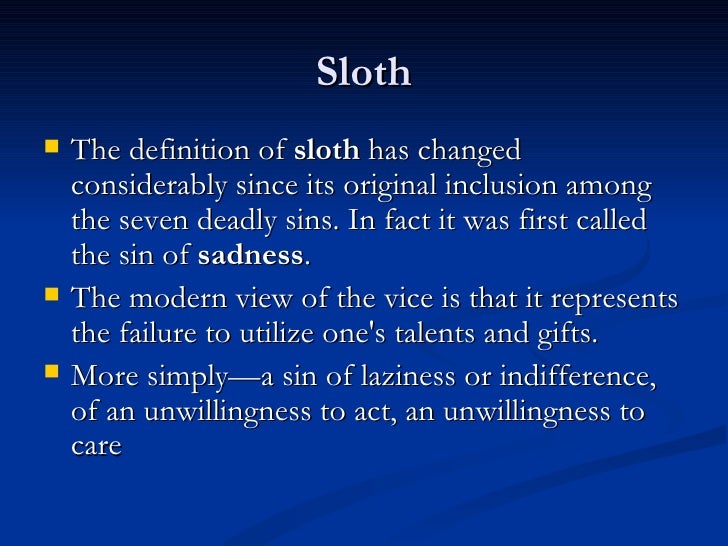
Humility (opposed to pride), kindness (envy), temperance (gluttony), charity (greed), chastity (lust), diligence (sloth), and patience (wrath). The deadly sin of sloth.
Unlike its counterparts, where the sinner had to commit an act in order to commit the sin, sloth is the sin in which one omits their desire or responsibility.
7 deadly sins meaning of sloth. Sloth is giving up on life and relationships; The obsession with personal gratification and/or pleasure. Sloth becomes a sin when it slows down and even brings to a halt the energy we must expend in using the means to salvation.
Of course, those suffering from it also neglect spiritual and divine matters, and that is why sloth is an abominable sin. It looks like laziness, but in reality it’s apathy. Seven basic human vices that, when taken in excess, can be percieved as evil, and potentially injure or kill the person indulging in said vices, or anyone around him/her.
This is speculation based in history and logic. Those living in sloth wish that everything were plain, always the same and neutral, with no joys nor pains. Over the past several weeks, we’ve looked at three of the seven deadly sins, including pride, envy, and wrath.
Then there was a short period of time while christian values were. Included with the seven deadly sins which give rise to other, secondary sins, sloth is actually a secondary sin itself—at least technically. The picture of genuine faith is not of monks hidden away in their monasteries, but rather of men and women engaged in their world.
This does not have to be sexual, but it usually is. For most of us, sloth is not one of those sins we think about often. The 7 deadly sins are a list of behaviors and thoughts that the catholic church has deemed to be the worst sins and ones that lead to living a.
In fact, sloth might be a something we never even considered a sin. The seven deadly sins are also called cardinal sins, with cardinal meaning “fundamental” and echoing capital’s sense of causation. The sin of sloth is known as one of the seven deadly sins.the sin of sloth is a bit deeper than laziness, and that subtlety is found in the thing that keeps us bound up:
Unlike its counterparts, where the sinner had to commit an act in order to commit the sin, sloth is the sin in which one omits their desire or responsibility. The seven deadly sins also have counterparts, the seven heavenly virtues: Humility (opposed to pride), kindness (envy), temperance (gluttony), charity (greed), chastity (lust), diligence (sloth), and patience (wrath).
Here, we’ll explore each of the seven deadly sins in more detail by unpacking their meaning and origins as well as instances of them in folklore, pop culture, and other stories. photo courtesy: Jesus hates it because he came for the exact opposite purpose: I suspect it is a matter of historical timing.
The deadly sin of sloth. To give us a rich and satisfying life. Pride, envy, wrath, gluttony, lust, sloth, and greed.
Light blue is used to represent sloth. Most animals were named in ancient times before the christian 7 deadly sins came into vogue. Many think the deadly seven are recorded in the bible.
Different from anger, wrath is the uncontrolled hatred for someone or something, and. The final version of the list consists of lust, gluttony, greed, sloth, wrath, envy, and pride. Everything we do is to be a means of salvation.
Surprisingly, even though each of the seven is a sin, this list is not contained in scripture. The seven deadly sins, as identified by pope gregory 1 in the late sixth century, are considered categories of sin: Envy | symbolism & meaning
The seven deadly sins, also known as the capital vices or cardinal sins, is a classification of objectionable vices that has been used since early christian times to educate and instruct followers concerning fallen humanity’s tendency to sin. The slothful person is unwilling to do what god wants because of the effort it takes to do it.